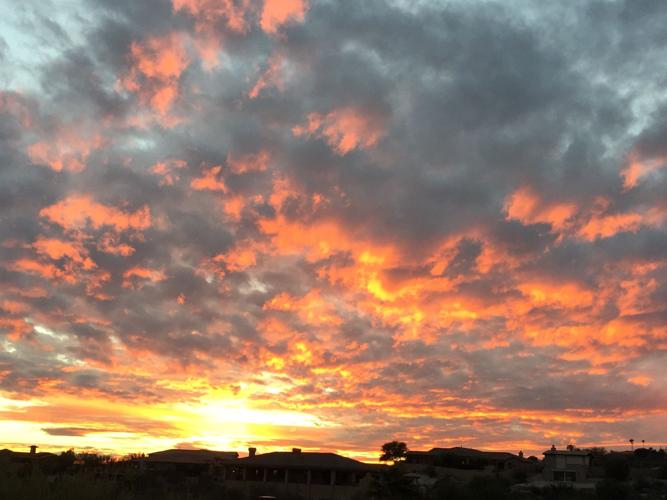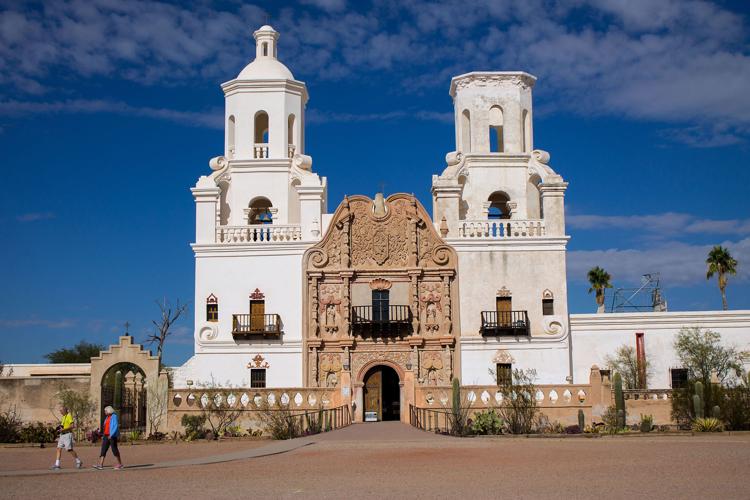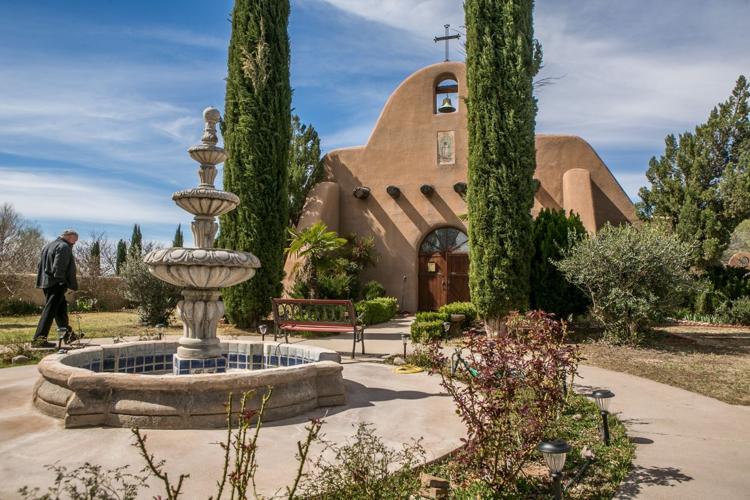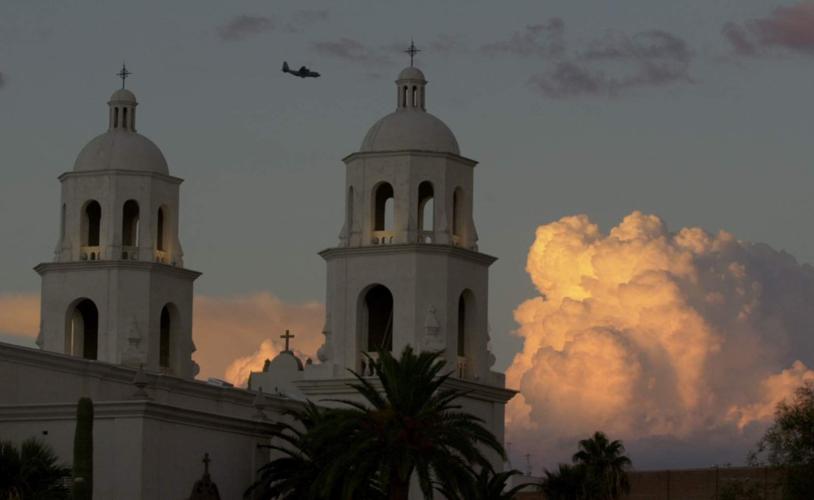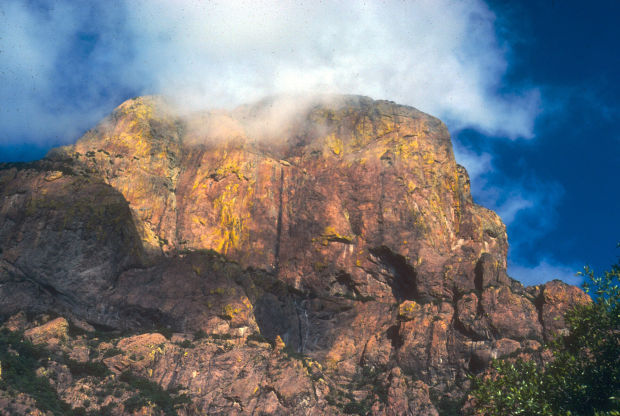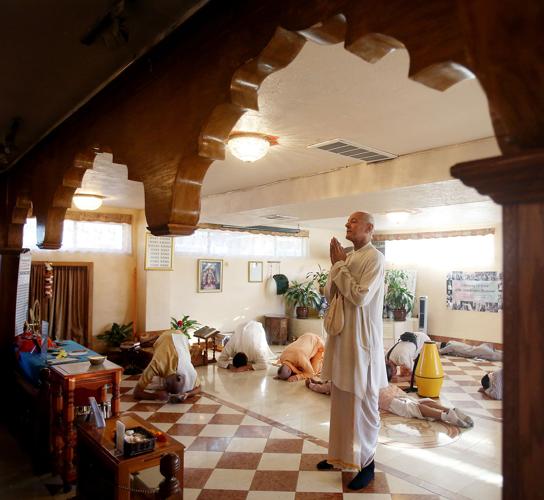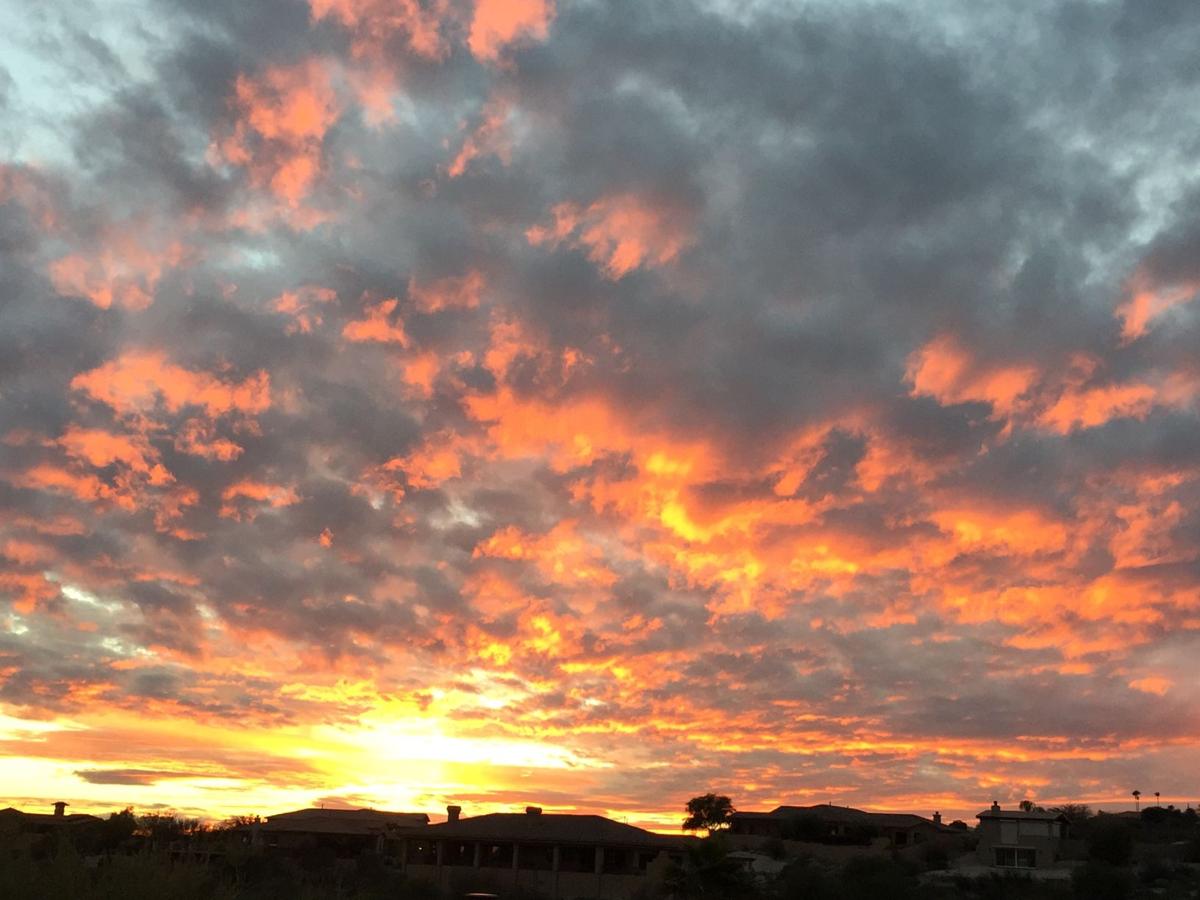Talk to enough people about what drew them to Tucson, and someone is bound to mention the jagged mountains, harsh landscape and otherworldly quality the desert takes on come sunset.
For many, it's a spiritual experience.
Just get out into the desert, with both its grandeur and severity, and look up at the saguaros and down at the city. It feels holy, sometimes.
We thought we'd highlight a few Southern Arizona sites that are both spiritual in purpose and beautiful. They're places that inspire contemplation even if you don't share the faith. Many have a story to tell about our history.
If we missed your favorite spot, please tell us what it is, so we can add it!
A version of this list originally ran on March 29, and we put it together with a bit of help from a reader.
Raquel Givens emailed us, suggesting a list like this. Her own interest in these kinds of spaces stems from a University High School art history project that took her to Mission San Xavier del Bac. Not a Catholic herself, Givens shared with us that she could still appreciate "the reverence, serenity and peace" the mission offered.
Mission San Xavier del Bac

The Mission San Xavier del Bac is one of the best examples of Spanish colonial architecture in the United States, and it's right here in Tucson.
Since we already mentioned it, we'll start here. Father Eusebio Francisco Kino established the mission in 1692, although the structure we have today dates to the late 1700s, constructed by the Tohono O'odham and Franciscan missionaries. (Father Kino was a Jesuit explorer and missionary).
The original builders never finished the east bell tower, and rumors abound as to why. But really? The builders just ran out of money.
The mission is a National Historic Landmark known for its Spanish Colonial architecture in a Baroque style. It's still an active parish.
Bonus: Go to Tumacácori National Historical Park, where you can find the ruins of another Father Kino mission.
Sources: "A brief history of the Mission San Xavier del Bac" by Patronato San Xavier, "Mission Possible: Restore San Xavier" published by the Arizona Daily Star April 25, 2015 and "Mission San Xavier del Bac: 11 things to know" published by the Arizona Daily Star January 21, 2017.
Garden of Gethsemane

Tucson's Garden of Gethsemane is a tranquil spot.
Tucson has its very own Garden of Gethsemane, the biblical grove of trees where Jesus Christ prayed and was arrested the night before his crucifixion. The garden west of Interstate 10 off of Congress Street is quiet and contemplative, shaded by towering trees. You'll find sculptures here depicting scenes including Jesus with his disciples at the Last Supper, Jesus on the cross, and Mary, Joseph and baby Jesus.
The garden grew out of a promise sculptor Felix Lucero made to God while he was lying wounded on a World War I battlefield. Its roots go deep.
Since its creation in the 1940s, the garden has survived a move for the Congress Street bridge, flooding and vandalism.
Sources: "Garden of Gethsemane" by the City of Tucson and "Spiritual Oasis" published by the Arizona Daily Star April 12, 2000.
St. Philip's in the Hills Episcopal Church

St. Philips In The Hills Episcopal Church is a very popular church in the Foothills,Tuesday August 26, 2003 in Tucson, Ariz. Photo by James S. Wood / Arizona Daily Star.
Another spot to inspire reflection and inspiration, this church on the northeast corner of Campbell Avenue and River Road was designed by Tucson-famous architect Josias Joesler in 1936.
With its listing on the National Register of Historic Places, the church showcases Spanish design.
The church has grown over the years and now includes an art gallery, memorial garden and labyrinth. (Side note: Princess Margaret, as in sister of Queen Elizabeth II, visited Tucson and this church in 1965. Have we all seen the second season of "The Crown" by now? 😍)
Sources: "Church gains landmark status" published by the Arizona Daily Star on March 15, 2005 and stphilipstucson.org.
Holy Trinity Monastery in St. David

Residents of the St. David monastery and RV park gather several times a day for prayer and worship.
This one requires a field trip, but we really think it's worth it (also tack on trips to Benson and Tombstone and make a weekend of it. How to do that here). The Benedictine monastery, which opened in 1974, spans an estimated 150 acres and includes multiple ponds, pecan orchards and a bird sanctuary along the San Pedro River. Take a picnic and wander the grounds or pop into the small chapel.
Also: There's an enormous Celtic cross that looms above the pecan and cottonwood trees and Stations of the Cross to pace.
Although the monastic community (meaning the monks who lived on the property) was dissolved in early 2017, a band of RVers and oblates (laypeople devoted to the Rule of St. Benedict) still live on site.
Bonus: The exterior of Tucson's iconic Benedictine Monastery at 800 N. Country Club will be preserved and turned into a public venue, following the relocation of the Benedictine Sisters of Perpetual Adoration to Missouri earlier this year. Several apartments are expected to surround the structure —as you can probably imagine, all of this has been in the news lately.
Sources: "Holy Trinity Monastery in St. David ordered to dissolve" published by the Arizona Daily Star April 23, 2017 and "Snowbirds embrace holy wintering at St. David monastery" published by the Arizona Daily Star March 26, 2016.
Jewish History Museum

The Jewish History Museum at 564 S Stone Ave., left, is next to the Holocaust History Center, background. The center has stories of Holocaust survivors and their families along with other programs. The museum itself was the first synagogue in the Arizona Territory, The photo was taken on Thursday, October 8, 2015, in Tucson, Ariz. A.E. Araiza/ Arizona Daily Star
The building that now houses the museum was actually the first Jewish synagogue in the Arizona Territory, dedicated in 1910. Temple Emanu-El, now at 225 N. Country Club Road, originally met here. Congregation Anshei Israel, also eventually took up residence in the building.
The building at 564 S. Stone Ave. eventually became the Jewish History Museum. The Holocaust History Center was constructed on the property in 2013. The expansion of the Holocaust History Center in 2016 allows the museum to further tell the story of Tucson's Holocaust survivors. The space is quiet, meditative and somber, but will leave you inspired by the resilience and contributions of Tucson's Jewish community.
Bonus: If you want more of Southern Arizona's Jewish history, there's a mostly abandoned Jewish cemetery in Douglas that the Jewish History Museum was working to restore. More on that here.
Sources: "Almost like new" published by the Arizona Daily Star March 27, 2001 and "Tucson's Holocaust story showcased at new center" published by the Arizona Daily Star February 19, 2016.
The Church of Jesus Christ of Latter-day Saints temple

The new temple for The Church of Jesus Christ of Latter-day Saints is on West Skyline Drive in the Foothills.
You can't miss it. The new Mormon temple looms large in front of the Catalina Mountains at 7281 N. Skyline Drive. The 38,216-square-foot temple was dedicated last August with public tours scheduled earlier last summer. It was the sixth Mormon temple built in Arizona and has a dome — unlike the steeples of most temples — to mimic Tucson landmarks such as the Pima County Courthouse and Mission San Xavier.
Only members of the Mormon church in good standing and with a recommendation from leadership can enter the temple now that the open houses are over. But anyone can wander the grounds. (If you want a peek inside, check out this story).
Sources: "Public tours of Tucson's new Mormon temple begin Saturday" published by the Arizona Daily Star May 30, 2017.
St. Augustine Cathedral

Clouds reflect the sunset in downtown Tucson behind the towers of St. Augustine Cathedral.
The cathedral adds some Tucson flair to our downtown skyline and dates to 1897. It was renovated in the 1960s and is named after Tucson's patron saint.
The hub of the Roman Catholic Diocese of Tucson, the cathedral remains an active parish today. The interior of the cathedral is everything you hope for from a historic Catholic church — grand, ornate and peaceful. Slip into one of the pews during the week, and you're likely to find flickering candles and prayerful people. There's also a lovely, newly restored chapel on the property.
Cathedral Square itself is currently undergoing some major construction. That enormous building going up just north of the cathedral will be offices and an event and education center for the diocese. Marist College — that old building that looked like it was about to fall down — is going to become a community center and affordable housing for seniors.
Bonus: Tucson has an abundance of beautiful, Catholic churches, including Santa Cruz Catholic Church and Holy Family Catholic Church.
Sources: "To stay downtown, diocese will restore Tucson's Cathedral Square" published by the Arizona Daily Star on January 29, 2016, "Neto's Tucson: 209-year-old Presidio bell to ring again" published by the Arizona Daily Star on August 14, 2016.
El Nacimiento

Maria Luisa Teña and the nativity scene she has spent 30 years creating at Casa Cordova at the Tucson Museum of Art November 27, 2007. Jeffry Scott/Arizona Daily Star. 138093.
Tucked away in the Tucson Museum of Art's historic La Casa Cordova, El Nacimiento is an elaborate Nativity scene that will make your jaw drop. You'll spot Mary, Joseph and baby Jesus and characters from other Bible stories among the 800-piece set. Some of the Bible scenes appear transported to Mexican villages and ranches.
Maria Luisa Teña created the exhibit that has been on display in Tucson since 1978. We called the museum earlier this week and were told the exhibit is already open. You can access the exhibit from the courtyard but need to pay museum admission ($12 for adults) to check it out. The museum is at 140 N. Main Ave.
Sources: "8 things to enjoy about the Tucson Museum of Art's holiday market" published by the Arizona Daily Star November 19, 2015, "This Nativity scene an 800-piece marvel" published by the Arizona Daily Star November 27, 2014 and "El Nacimiento: Much more than Nativity" published by the Arizona Daily Star December 22, 2005.
Baboquivari Peak southwest of Tucson

The Tohono O'odham believe I'itoi, the creator, lives in a cave on the flanks of Baboquivari Peak.
Southwest of Tucson, this towering peak challenges rock climbers around the state. The Tohono O'odham consider this peak to be the center of the universe and therefore a scared site. They believe their creator I'itoi lives here in a cave, making the roughly 7,730-foot peak worthy of pilgrimage.
The eastern part of the mountain is managed by the federal government and west of the range is tribal land. Permits may be required to hike here. Keep in mind that you're treading on sacred ground.
Bonus: Speaking of mountaintop meditation, a Byzantine Catholic chapel is under construction up in Summerhaven on Mount Lemmon. It's not yet done, but the chapel dedicated to Our Lady Undoer of Knots blends styles of the American frontier and eastern Europe.
Sources: "Big Jim: I'itoi and Baboqivari" published in the Arizona Daily Star January 28, 2014, "Baboquivari Peak: Sacred summit is focus of festival" published in the Arizona Daily Star February 13, 2015, "Tohono O'odham celebrate culture" published in the Arizona Daily Star December 13, 2006, "I'itoi where dwells" published by the Arizona Daily Star November 30, 2003 and the Bureau of Land Management.
Saint Anthony's Greek Orthodox Monastery in Florence

This monastery in Florence, Arizona, is dedicated to St. Anthony the Great from the third century. This place has gardens, fountains and pathways lined with palm trees. It's out of the way, but if you're on the back road to Phoenix (here's why you would want to do that in the first place), it's definitely worth a stop.
Wander the quiet campus and spend a moment at the hilltop chapel taking in views of the surrounding desert.
Members of the Greek Orthodox Church built this desert oasis in the 90s. If you want to visit, you'll need to stop by between 10:30 a.m. and 2:30 p.m., and women need to wear floor-length skirts, long-sleeved shirts and scarves.
Sources: "Take the 'back road' to Phoenix for a scenic taste of Arizona's treasures" published by This Is Tucson February 22, 2018 and stanthonysmonastery.org.
Govinda's Natural Foods Buffet

Vino Vitthala, aka Nityananda, a priest, gives prayer as worshippers bow during a morning service at the Chaitanya Cultural Center of Tucson. The temple opened in 1987. Its restaurant, Govinda’s Natural Foods Buffet, opened in 1992.
You don't expect to find a waterfall and lush oasis at 711 E. Blacklidge Drive. Govinda's Natural Foods Buffet's campus actually doubles as a temple for Hare Krishna devotees, who also operate the restaurant. The temple opened in 1987 with the restaurant following in 1992.
Sources: "The new Hare Krishnas" published by the Arizona Daily Star February 12, 2004 and "Tucson's Hare Krishna community opts for spiritual living in material world," published by the Arizona Daily Star October 17, 2016.
San Pedro Chapel

People can make paper flowers Saturday at the San Pedro Chapel, one of the many stops along the Old Fort Lowell Neighborhood self-guided walking tour in 2009.
Today, you can get married in this teeny chapel that once served as a parish. The current San Pedro Chapel, 5230 E. Fort Lowell Road, was built in the early 1930s by parishioners who had already built two previous churches on the site in the Old Fort Lowell Neighborhood. The chapel was the center of the village El Fuerte.
The first church, built in 1915, was so small that only the priest and the altar could fit inside and the congregation had to stand outside beyond the doors. Its larger replacement was destroyed by a tornado in 1929. The church closed its doors to religious purposes in 1948 and has had several lives since then. Its most recent incarnation is as an event space.
Bonus: Another small chapel that we adore is currently closed until further notice. The DeGrazia Gallery in the Sun's Mission in the Sun is dedicated to Our Lady of Guadalupe, built in honor of Father Kino. The chapel was damaged by a fire in May 2017 and has been closed for restoration. You can learn more about it here.
Sources: "Saving El Fuerte's little chapel" published by the Arizona Daily Star October 21, 1991 and "Old Fort Lowell renewal" published by the Arizona Daily Star May 17, 2001 and "Old chapel gets new life" published by the Arizona Daily Star September 25, 2008.
Editor's note:Which sites would you add? Email us at thisistucson@tucson.com.


